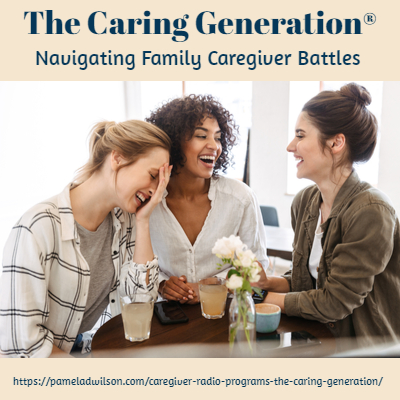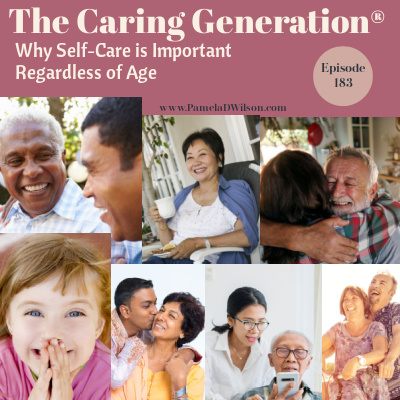Family Caregiver Battles

The Caring Generation® – Episode 124 February 9, 2022. On this episode, Navigating Family Caregiver Battles, caregiving expert Pamela D Wilson talks about winning the inner battle of being a caregiver—whether you are caring for yourself or someone else. Plus why all caregivers must remain mentally sharp to survive the long haul of caregiving and manage competing priorities.
Have a question? Follow and connect with Pamela on her social media channels of Twitter, Linked In, Facebook, Instagram, and YouTube or complete the caregiver survey on her website.
To listen to the caregiving podcast, click on the round yellow play button below. To download the show so that you can listen anywhere and share it with family, friends, and groups, click on the button (the fourth black button from the left) below that looks like a down arrow. Click the heart to go to Pamela’s Spreaker podcast page to like and follow the show. You can also add the podcast app to your cellphone on Apple, Google, and other favorite podcast sites.
Family caregiver battles can be physically and mentally exhausting. Today, we are talking about the long haul of caregiving by asking questions to identify tips for winning.
Family Caregiver Battles
Watch More Videos About Caregiving and Aging on Pamela’s YouTube Channel
Why caregivers —whether you are caring for yourself or someone else—must become mentally sharp when navigating family caregiver battles that can occur with the care receiver, within the family, and the healthcare system. We’ll begin talking about what happens when aging parents and spouses get sick.
15 Questions Family Caregivers Must Ask
Then look at typical responses within the family and then talk about tips for how to survive over the long haul while managing competing priorities. Let’s begin with questions. Remember, there are no silly questions. The questions you don’t ask or are afraid to ask or those that can get you into trouble.
With any diagnosis, one of the first questions to ask is why is this happening? The why is important because you may be placing your future at risk if you accept the diagnosis at face value. Understanding the why gives you a choice to maintain your health or improve.
How many of you have seen options for any type of service, maybe a car wash or getting your car serviced, that say just okay, good, better, or best. Or how many have you gone to a restaurant and they said would you like tap water or bottled water? What do you want for your health—just okay good, better, or best—or do you want just okay?
1 What Do Caregivers Want
This is one of the first questions to ask when navigating family caregiver battles. If you are the person with the health condition, what do you want? If you are caring for an elderly parent or a spouse, what do they want, just okay, good, better, or best?
Everyone might say the best without knowing what it takes to get the best. If best means that you give up junk food and exercise for two hours every day, are you up for that? If just okay means that the doctor prescribes you a pill, and over time, the health condition you have gets worse and creates more health problems, so you generally don’t feel okay all the time. Are you okay with that?
2 Are You a Caregiver Warrior or Victim
Then there’s somewhere in the middle of good or better. As a person who needs care or the caregiver, you can decide if you’re the warrior or the victim. You control, or you feel influenced by people or events.
So to answer the question of why this is happening – high blood pressure, diabetes, breathing problems, or pain—we have to look at how our actions contribute to the diagnosis and then decide to do battle or give up and say, this is the way it is. We choose to fight or give up every day when we roll out of bed navigating family caregiver battles. Are we battling with ourselves, other people, or things like health issues?
3 Why Do Caregivers Refuse Help
The second battle for navigating family caregiver battles is the idea of refusing help. For example, mom or dad is in the hospital and goes to a nursing home for rehab. Upon returning home, physical therapy is prescribed so that they can continue to get physically stronger, But they or you, the caregiver, say no, we don’t need that, we’ll be okay.
What’s the risk of saying yes? Do you want just okay, good, better, or best for yourself or a loved one?
Why deny yourself support or assistance? Don’t you think you need it? How do you know? Can you describe the short- and long-term consequences of saying no?
If you can’t answer this question, you could be making a mistake for which you can’t turn back the clock. Yet, research confirms that many patients and caregivers say no. The situation worsens.
4 Do Caregivers Have to Go It Alone
The individual or the family caregiver feels like they’re going it alone. Try to figure out what to do next, and it’s as if caregiving is a do-it-yourself job. It can be if that’s the choice you make navigating family caregiver battles.
Warrior or victim, which will you choose to be? My vote is always for better health and being a warrior. If you are a long-haul caregiver, you probably feel like you’re going it alone, especially if your aging parent or a spouse didn’t realize they had choices for just okay, good, better, or best.
The difference is that you do. The time is now to decide. Now, you can’t change everything overnight, but you can decide to stop saying—this is the way it is. You can stop refusing help and become the warrior in the inner battle between your ears that only hears “I can’t.” Yes, you can.
5 How to Know If You’re Doing a Good Job
Now to be fair with health concerns, your doctor may not have done you any favors. If they diagnosed you with a condition and wrote a prescription without asking if you had any questions, they didn’t do their job. If you didn’t ask about options or consequences, you didn’t do your job.
Navigating family caregiver battle is tough, isn’t it when nobody does their job? When no one takes the time to really care. This is why caregiving becomes a long-haul job when everyone believes this is the way it is. When they fail to ask questions, they refuse to ask for help. It doesn’t have to be that way.
6 What Caregivers Can Do Differently
I hear that question in your mind, what can we do? What should we do? Start asking those questions every day. What can I do today? What can I do differently or better tomorrow? You got it! So to go from just okay to good, to better or best to win family caregiver battles, you have to be at your best.
Start with confirming what you want if you’re caring for yourself or what the person you’re caring for wants. If you’re talking to yourself, the only disagreement you’re like to experience is an internal battle of thinking you want one thing and taking actions that say something else.
For example, I will get up at 6 am and walk 3 miles before I go to work. Tomorrow morning the alarm goes off and what do you do? Jump out of bed or hit the snooze button, saying I’ll do it tomorrow. Make your choice – just okay, good, better, or best.
7 What Do You Expect?
If you have no expectations for yourself, your life and health will be just okay. If, on the other hand, you’re caring for someone, they have to answer the question of what they want and choose between victim or warrior or something in the middle.
Remember those commercials? Pay me now or pay me later? That’s exactly the issue with old age problems.
If you don’t take care of your health today, you are likely to pay later with more expensive health care needs, needing a caregiver, maybe having to leave your home to live in a care community—which some seniors like—leaving to live in a nursing home, which most elderly and their family members dread.
8 How To Plan for the Future

Son having a difficult discussion with his elderly mother
Navigating family caregiver battles is complicated, especially if you’re trying to convince a parent or a spouse to change habits. It’s difficult to predict the future. What life will be like for an elderly parent who has a stroke, a diagnosis of dementia, a heart attack, asthma, or other health conditions?
How do you find out? Talk to someone who knows. In my consultations with family caregivers and their aging parents or spouses, many are looking for confirmation of what they believe the problem to be.
Next, they’re looking for experts with wisdom. I say wisdom and not knowledge because anyone can read a book and learn concepts.
Wisdom is gained from having experiences and learning from the experiences by implementing the suggestions. That’s the difference between receiving information, understanding the information, asking questions, and using or deciding what to do with the information.
9 What Is the Difference Between Receiving and Seeking Information
How is receiving information different from seeking information? How many of you have family members who constantly tell you what to do when navigating family caregiver battles?
That’s receiving information. How does that make you feel when your brother, sister, or someone else tells you what to do? Especially if you didn’t ask for the information?
Translate this to attending a doctor’s appointment. The doctor gives you information but doesn’t make a recommendation. Why, because you didn’t ask.
And quite frequently, when the doctor makes recommendations to patients who don’t ask, what do you think happens? The patients ignore their advice. No surprise.
10 Are You Showing Up 100% of the Time or Complaining
Unsolicited advice is a dead-end, wasted breath, wasted energy, and action. Choose. Will you be the warrior who wants the best and asks for advice, information, or education or the victim who says, well, my doctor didn’t tell me? How was I supposed to know? You blame other people and say you should have told me. Nope. None of that.
Navigating family caregiver battles or taking care of yourself requires that you show up 100% of the time. Are you thinking, maybe half the time, I’m exhausted, maybe even burned out?
Or, maybe you’re looking at mom, dad, or a spouse and noticing that 100% for them is maybe 25% for you. That’s okay everyone has different energy levels. Being at 100% can relate to energy and also mental commitment.
11 Are You Mentally Committed or Exhausted
If you’re mentally committed, you can increase your energy level for navigating family caregiver battles. As long as you’re not in the camp where you believe nothing can be done, anything is possible.
The next step in navigating family caregiver battles is to look at your assumptions and the assumptions of others involved. This could be the person you’re caring for, siblings, a parent, or people in the healthcare system.
12 How Caregivers Can Receive Specific Advice
Based on more than 20 years of working with caregivers and older adults, my recommendation is to assume nothing, ask questions, and verify all information. Caregivers express frustrations to me about being given poor direction or lousy advice from other people. Looking at this from both sides, I can explain how this happens.
If you follow me on social media, you know that I respond to caregiver questions by creating videos for YouTube and Facebook. I create a Livestream caregiver event about once a month. Caregivers ask me questions, but sometimes they don’t provide enough background or information for me to give a specific answer.
However, if you and I scheduled a 30 or 60-minute phone or video call, I’ll have the opportunity to ask enough questions to give you a concrete answer and even next steps if that’s what you’re seeking. Context or background information allows specificity.
13 Are You Looking for Guesstimates or Trustworthy and Proven Information
It’s kind of like calling the doctor’s office saying you don’t feel well without giving any information. Do you expect the doctor to pull out their crystal ball and guess what’s wrong with you? Are you looking for a guess? Or would you rather have a fairly specific answer to address the issue?
Sometimes, caregivers or patients don’t know what information is needed to get a particular solution. Or family caregivers ask a person who doesn’t have deep experience on the topic and they get a superficial answer that doesn’t work.
I understand the frustration level that caregivers and elderly adults feel when you seek information which may be why you simply give up when you can’t find what you’re looking for. When you think nothing can be done. Being a warrior instead of a victim takes persistence, more than you might realize.
14 How To Manage Competing Priorities
How do you succeed when there are so many competing priorities in life? If you’re the caregiver, you may work to support your family. You might have children in school and care for an elderly parent and possibly a spouse—double duty caregiving. Navigating family caregiving battles often means managing competing priorities.
If you’re a long-haul caregiver burning the candle at both ends, you may already worry that you’re not doing a good job in one or more parts of your life. Maybe you’re taking time off work and worrying that your employer will think that you’re not committed to your job. I’ve been there.
Some employers don’t understand the stresses faced by family caregivers. Maybe you have a high-priority client meeting tomorrow. Mom or dad just went into the hospital, so you know you’re not as
mentally sharp as you should be. Maybe you lost your patience with your spouse or children because you just got off the phone with your parent who needs help and mom or dad has no idea what your life is truly like.
15 Are You Efficient or Effective – What’s Your Plan for Aging Parents
Are you an efficient or an effective caregiver? How do you know? For more on this, listen to The Caring Generation Podcast Episode 120 called How Can I Be An Effective Caregiver. You also might like my multimedia caregive Livestream event, What’s Your Plan for Aging Parents or Yourself?
When I was managing care for my clients as a power of attorney and care manager, I had days where my staff and I had to triage urgent and important tasks. If you are navigating family caregiver battles, you probably find yourself in a similar position.
Tips to Navigate Caregiver Battles
 Looking for suggestions to manage caregiver battles in your mind and between people in your life? These suggestions can help.
Looking for suggestions to manage caregiver battles in your mind and between people in your life? These suggestions can help.
Find quiet time to plan
Here are the steps to take. First, you must find a little quiet time to gather your thought and tasks on a piece of paper. Let’s define the meaning of urgent. In navigating caregiver battles, the word urgent has different meanings.
For example, your mom watching television at 2 am drops the remote control and calls to you over the baby monitor you have installed in her room. She wants you to come to pick up the remote.
To your mom, dropping the remote is an emergency. To you, getting a good night’s sleep to go to work in the morning is more important. So you can see one person’s emergency may not be your emergency.
Stop being overly helpful
How many of you have heard the saying? A lack of planning on your part does not constitute an emergency on my part. Do you have co-workers who wait until the last minute to complete a project only to run into snags that make it impossible to meet the deadline, and you’re the one responsible.
Sometimes you might feel as if you have to babysit everyone. As a caregiver, you may create that scenario by being too helpful and desiring to be the go-to person. Another reason why you have too much on your to-do list.
Understand the difference between urgent and important
Urgent versus important. Mom or dad fall and need to go to the emergency room – what’s your vote? That one is urgent. Show up. Are you distracted by social media or email when you’re working on your computer? Not urgent. Low priority. Limit your social media to non-working hours or breaks during the day.
Talking to elderly parents about a plan to help them do as much as possible for themselves. What’s your vote? This conversation might be urgent if not having this discussion is resulting in tradeoffs in other areas of your life. It might be ranked important if mom or dad isn’t feeling well today and you have to take them to the doctor to avoid a possible hospitalization.
Choose struggles
And while cleaning the spoiled food out of your parent’s refrigerator or cleaning their bathroom needs to be done, these tasks are a lower priority that could be done by someone else. Navigating family caregiver battles is sometimes about choosing your struggle.
Maybe you have siblings who could be helping but who refuse. Is spinning your emotions to be angry at a brother or sister a good use of your mental power when you need 100% of you to be the warrior who doesn’t give up? Don’t waste the brainpower being upset. Instead, move ahead on more critical priorities to care for your parents and free up your time.
Monitor commitments
Managing expectations is critical to navigating family caregiver battles. Aging parents or a spouse can expect caregivers to wait on them. If this is you, you know what I mean.
Monitor commitments in all areas of your life and stop taking on more than you can manage. Constantly saying yes and doing too much is part of being a caregiver.
Estimate time
Learn how to estimate your time accurately so that you stop overcommitting and have a little breathing room in your schedule to take care of yourself. You’ll wear out if you don’t.
Navigating family caregiver battles means learning how to manage your emotions. Long-haul caregiving can wear you down so that you can’t give 100%. You may even feel so overwhelmed that you don’t have time to think.
Why Do Caregivers Need Breaks
I recently created two videos on this topic. The first is What is Respite Care and the other Why Do Caregivers Need Breaks? You can find them on my Youtube Channel, PamelaDWilsonCaregivingExpert
Another skill to be learned in addition to setting expectations and boundaries is the skill of negotiation. Also known as a give and take or reciprocity.
While you may want to do it all as a caregiver, it’s simply not possible if you’re going to maintain your life, sanity, health, and well-being. It’s time to call on the warrior in you who says enough is enough. I overextended myself in trying to make everyone happy.
Now it’s time to step back. It’s time to diagnose the problem like we talked about at the beginning of the program and ask, how did this happen?
Do you make everyone else happy
Did you say yes too much? Try to make everyone else happy except yourself? Feel obligated to meet the expectations of the person you care for, all the while running your physical and mental health into the ground.
Instead, decide what you can continue to do for a spouse or aging parents and investigate outside support for things you can’t. If you don’t know how to do that, I can help.
Start asking questions. Can your spouse or children contribute if you need more help around the house?
What unimportant or low-priority things can you need to eliminate from your life to create breathing space-time away from caregiving so you can play and enjoy life a little?
What low priority tasks can you eliminate
Make a list of everything you do and rank them in urgency and importance. I don’t know how many items you have on your list—25, 50, 100.
How many items at the bottom of the list do you regularly do that don’t contribute anything positive to your life? You do them because you’ve always done them.
Be The Caregiving Warrior Who Wins
Navigating family caregiver battles means being the warrior instead of the victim who says, this is just the way it is. I can’t do anything about it.
Being a warrior means being a person who accepts help and always believes there are options. Believes that there is hope. Because there’s always hope, and there’s always something that can be done.
It’s up to you to make it happen. If you need a little help getting started, schedule a 1:1 eldercare consultation with me.

Looking For Help With Your Caregiving Situation? Visit Pamela’s Caregiver Support and Resources Page.
©2022 Pamela D. Wilson All Rights Reserved





